
Urology vs. otolaryngology is one of the debates among medical students interested in physiology. Both specialties allow you to explore the complex workings of the human body and use your skills to improve patient outcomes. However, they also have significant differences, such as the scope of practice, the work environment, and the training requirements.
How do you decide which one is right for you? In this article, we will provide helpful information and tips to help you make an intelligent decision on urology vs. otolaryngology and find a fulfilling career that matches your interests and abilities. We will also help you evaluate practical factors such as job availability, salary, and training duration.
Urology vs. Otolaryngology: Salary and Job Security
Consider specializing in urology or otolaryngology if you want to earn a lot of money and have a steady demand for your services. But be prepared for a competitive job market after fellowship, even if you graduate from a prestigious program.
There are many job openings in the fields of otolaryngology and urology. Hospitals are often in high demand for otolaryngologists and urologists, and the future outlook for careers in these specialties is positive.
According to recent data, urologists earn an average annual salary of $506,000, while otolaryngologists have a slightly lower average salary of $485,000. Of all medical specialties, only orthopedists and plastic surgeons have a notably higher average annual salaries than urologists, with orthopedists earning $573,000 and plastic surgeons earning $619,000.
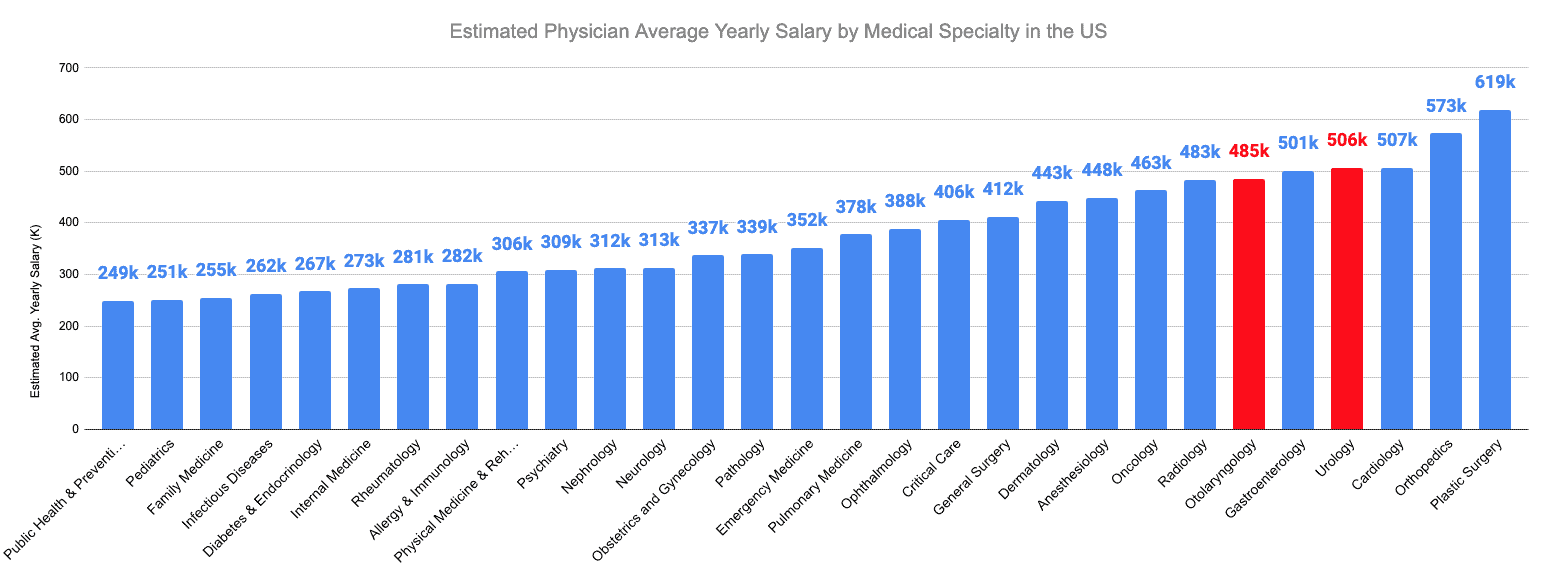
Urologists earn $506,000 per year on average, while otolaryngologists earn less with $485,000 annually
Urology vs. Otolaryngology: Competitiveness
Here we can assess the competitiveness of a specialty by looking at the unmatched rate – the % of people who apply and do not match into their preferred specialty. Among US seniors, otolaryngology had a 30.8% unmatched rate, making it a highly competitive residency.
To become a urologist, graduates must complete a one-year internship in general surgery, followed by a four-year residency program in urology. The percentage of US seniors unmatched in general surgery was 18.4%, making it less competitive than otolaryngology in the 2022 match.
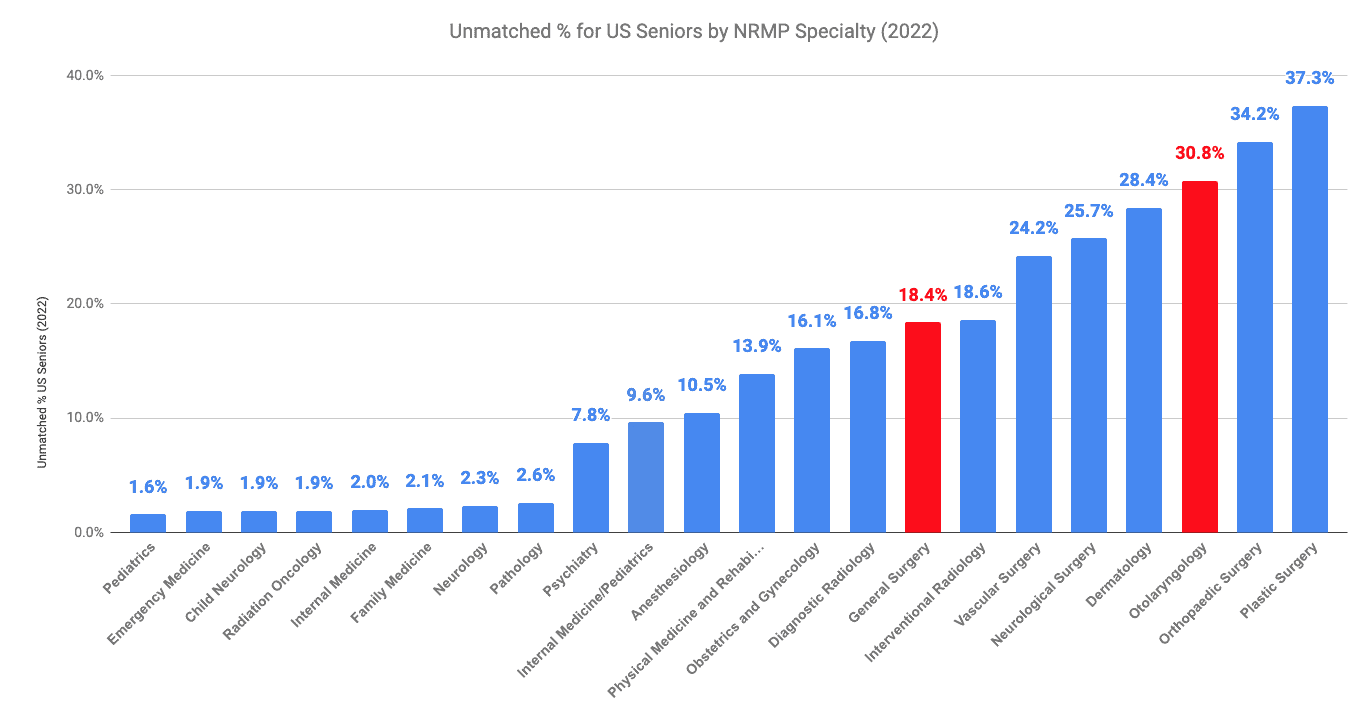
Otolaryngology had a 30.8% unmatched rate, while general surgery had an 18.4% unmatched rate among US seniors
Training Path: Residency
Urology involves a one-year internship in general surgery, followed by a four-year residency program in urology. Otolaryngology involves a five-year anesthesiology residency.
An otolaryngology residency is typically more competitive than a urology residency. Your USMLE scores, med school, and research are the main things for residency applications. Research is also a big thing for fellowship applications, and your residency program counts more, but your USMLE scores matter much less.
Urology vs. Otolaryngology: Work-Life Balance
Work-life balance is a crucial factor for many medical professionals. Both urologists and otolaryngologists have demanding schedules with long hours and on-call responsibilities. However, due to the nature of their work, otolaryngologists may have a slightly better work-life balance compared to urologists. Otolaryngologists generally have a more predictable work schedule and may have more chances to take time off.
Urologists work an average of 54.7 hours, ranking near the upper end of all medical specialties. In comparison, otolaryngology ranked above the middle of medical specialties, with an average of 52.4 weekly working hours.
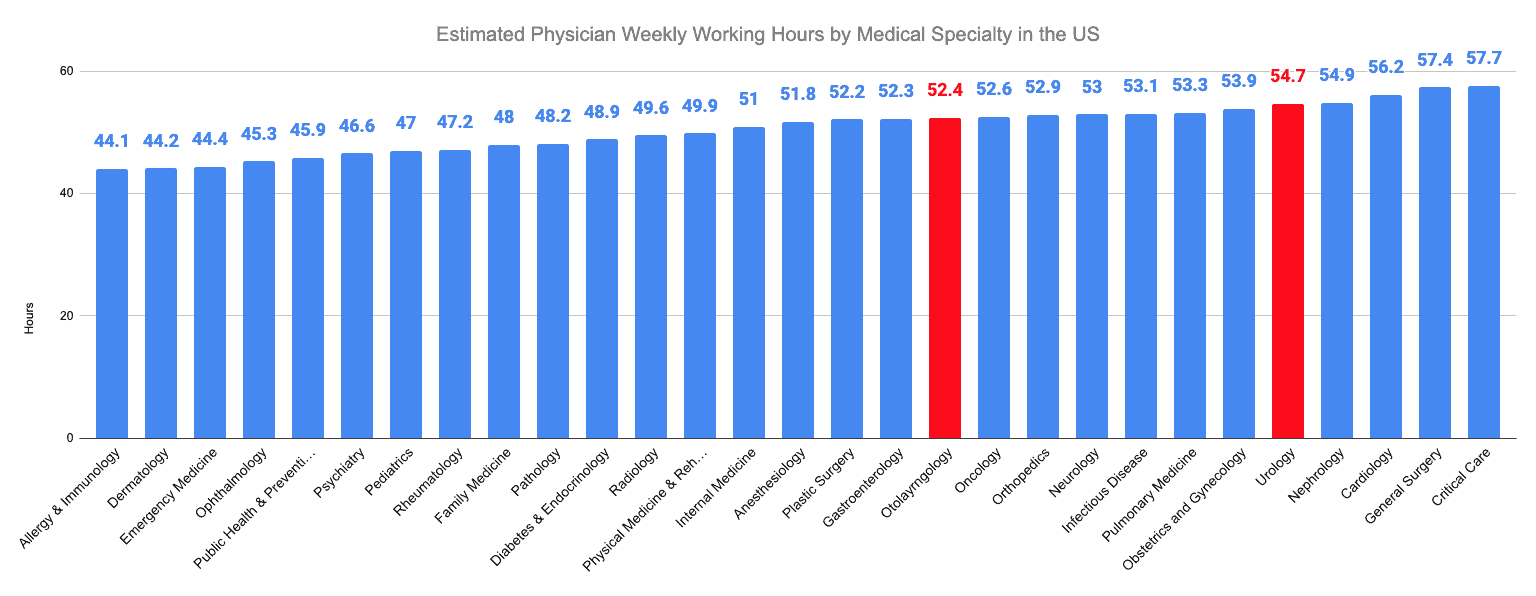
Urologists work an average of 54.7 hours per week, while otolaryngologists work fewer hours, at 52.4 per week.
Both otolaryngologists and urologists require administrative paperwork tasks, such as referral letters and diagnostic tests, resulting in an estimated 14 hours of admin/paperwork per week.
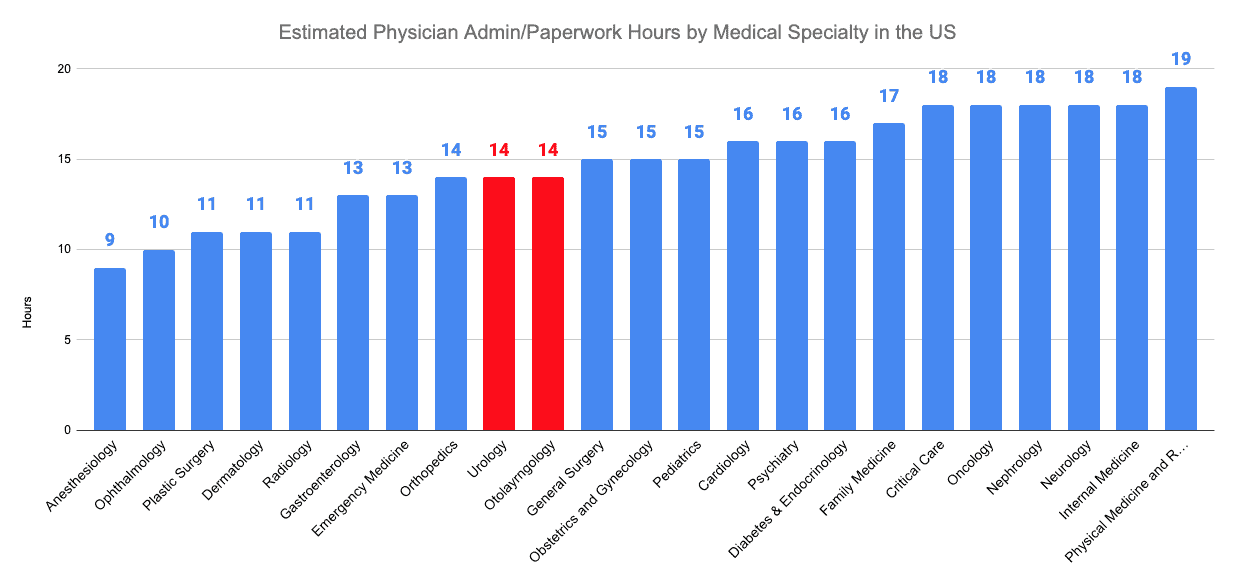
Both otolaryngologists and urologists work on admin/paperwork an average of 14 hours per week
Training Duration and Subspecialties
The training duration is a key aspect to consider when choosing between urology vs. otolaryngology. Otolaryngology and urology both have a five-year residency program.
After completing a urology residency program, urologists often choose to pursue additional training in specialized fields such as endourology or andrology. This can increase the length of your urology training.
Urology vs. Otolaryngology: Job Satisfaction and Burnout Rates
Job satisfaction plays a significant role in career fulfillment. According to various studies, urology tends to have slightly higher job satisfaction rates than otolaryngology. Many urologists express contentment with their career choice and would choose it again if given the chance. Additionally, urology has slightly lower reported burnout rates than otolaryngology.
According to recent data, urology ranked at the upper end of all medical specialties with 96% of urologists stating that they would choose the same specialty again, while otolaryngology ranked slightly lower with 91% of otolaryngologists feeling the same way.
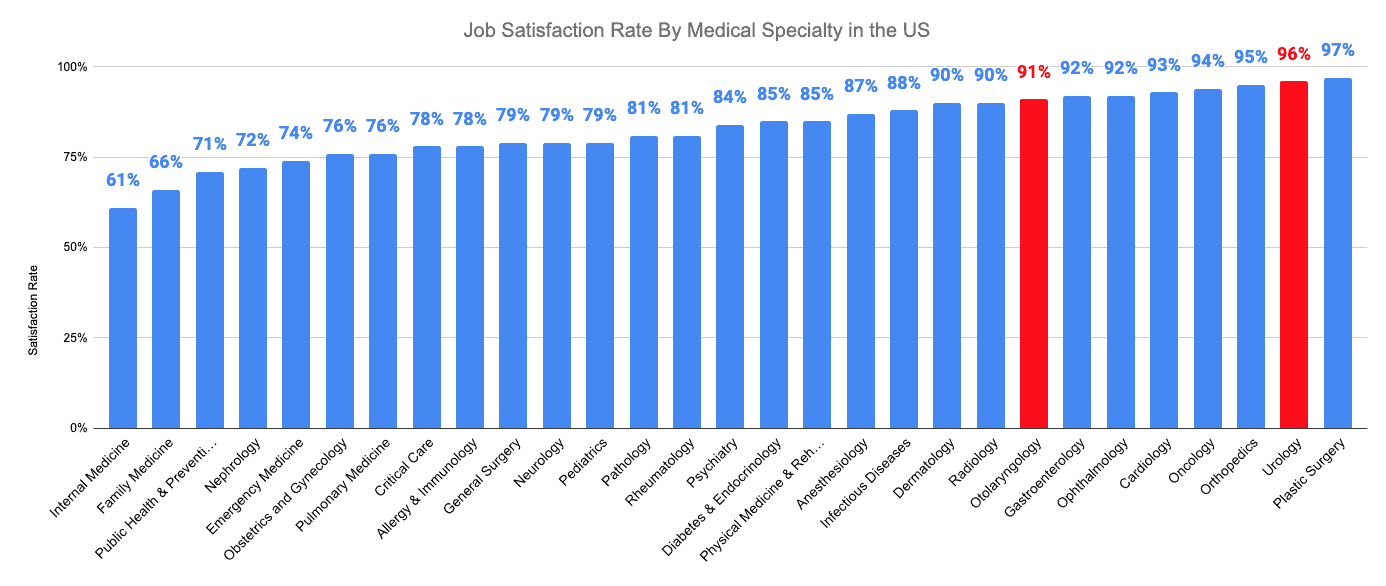
Urologists reported a 96% job satisfaction rate, while otolaryngologists reported lower satisfaction with 87%
That being said, the burnout rate for urology was 47%, ranking near the lower end of all medical specialties. In comparison, otolaryngology had a burnout rate of 49%, ranking below the middle of all medical specialties.
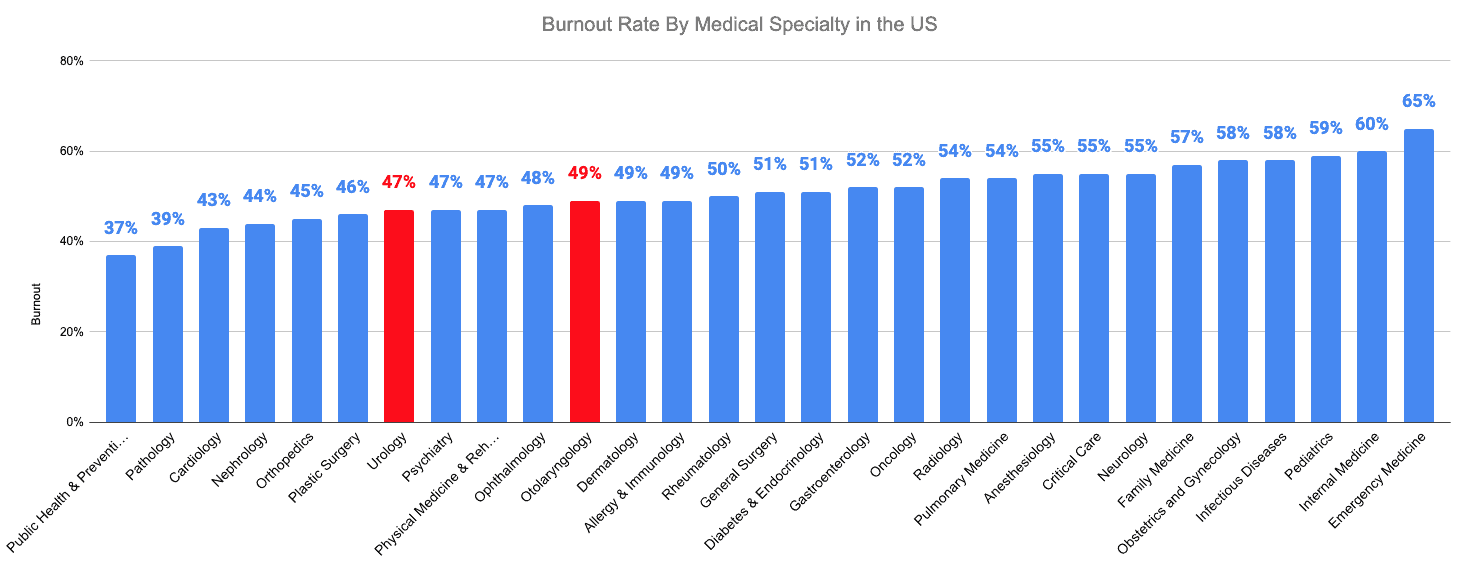
Urologists have a burnout rate of 47%, while otolaryngologists have a higher burnout rate of 49%.
Urology vs. Otolaryngology Comparison
To provide a visual overview, here’s a table comparing urology and otolaryngology:
| Aspect | Urology | Otolaryngology |
|---|---|---|
| Average Salary | High | High but generally lower than urology |
| Job Security | Steady demand due to various urological conditions and an aging population | High demand due to the wide range of conditions treated |
| Training Path | Typically involves 5 years, including one preliminary general surgery and 4 years of urology residency | Typically involves 5 years of otolaryngology residency training |
| Lifestyle | Predictable work schedule and increased opportunities for time off, but may involve on-call responsibilities | More predictable work schedule and may have more chances to take time off. |
| Administrative Paperwork | Moderate documentation requirements | Moderate administrative requirements. |
| Job Satisfaction | Generally high | Lower |
| Burnout Rates | Low to Moderate | Slightly higher |
| Personality | Strong analytical and diagnostic skills, along with effective communication with patients | Good hand-eye coordination, ability to handle stress and pressure |
Please note that this table serves as a general comparison. To determine the most suitable career for you, consider your personal and career priorities and goals.
Concluding Thoughts
Choosing the right specialty between urology vs. otolaryngology depends heavily on your priorities. To determine this, try reverse engineering your ideal life and identify your top priority. A helpful exercise is to write down the top five things you want to achieve in your career and personal life. Knowing these priorities will make finding a career that aligns with them easier. Often, the biggest obstacle is not a lack of knowledge about different fields but a lack of self-awareness about our own preferences.







